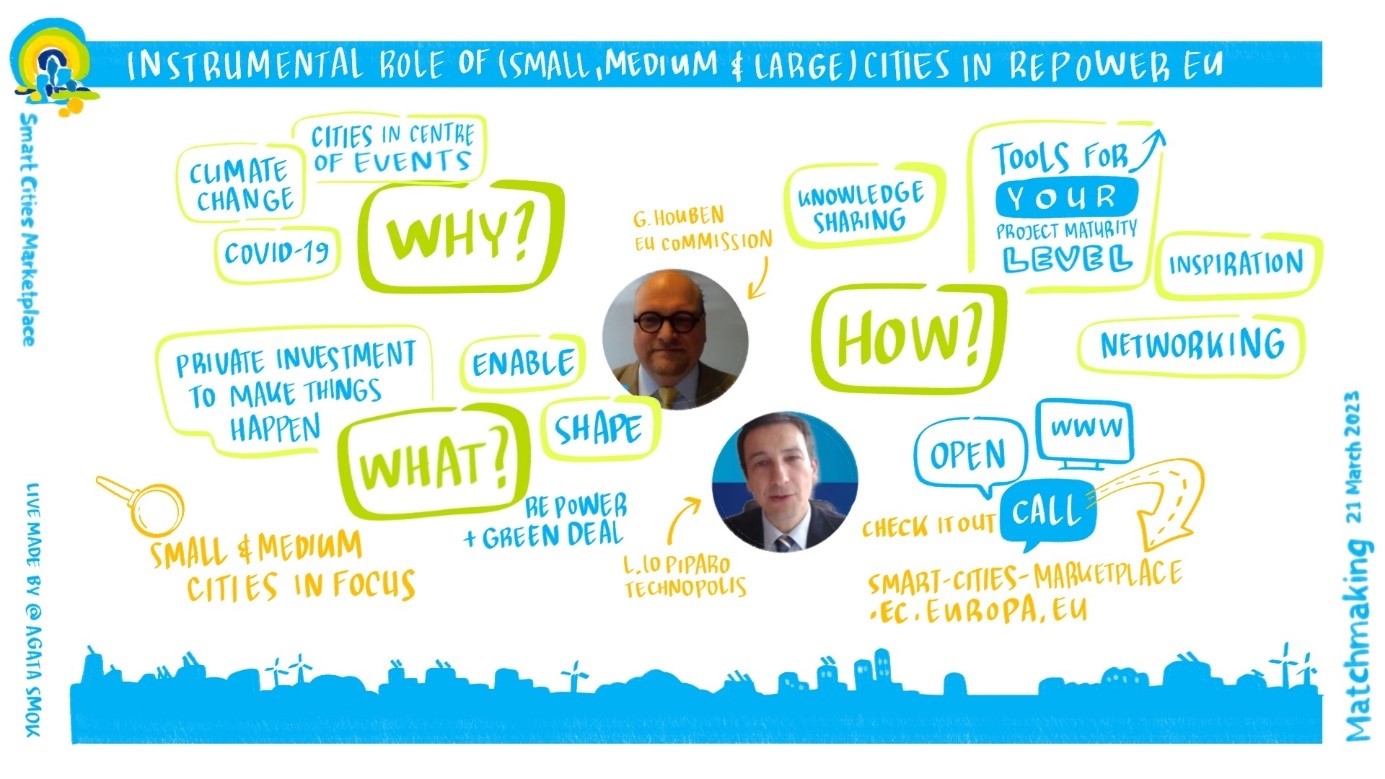The first matchmaking event of the Smart Cities Marketplace took place online on 21 March 2023.
With over 60 meetings booked via the online platform during the matchmaking slots, the event was a success for the Marketplace as well as the over 170 registered participants from more than 30 countries. During the event, in three plenaries and seven sessions with overall 25 speakers, the opportunities for cities to roll out and upscale sustainability projects were discussed and presented. Six projects/companies shared their cooperation opportunities with the participants.
Find all recordings here.
The Smart Cities Marketplace is to here help you with shaping and supporting your project development. (Georg Houben, European Commission, DG ENER)
The focus of the matchmaking event was on presenting the Smart Cities Marketplace (SCM) as an ideal platform to accelerate the implementation of the REPowerEU plan and support cities and small and medium-sized municipalities on their journey towards a clean energy transition.
More specifically, answers to the following questions were addressed throughout the one-day event:
- How can you accelerate your project idea?
- What options are available to make your city or town climate-neutral and truly smart?
- How to prepare the financial part of a project concept to make it more attractive for investors?
- How to accelerate city-business cooperation to roll out smart and sustainable investment projects?
The following initiatives contributed to the event: Covenant of Mayors, EUCF, EIT Urban Mobility and Viable Cities.
Main Take Aways
- Small and medium size cities risk being left out of the Green transition, given their lack of capacity, knowledge, sufficient critical mass to access funding/financing, skills, etc.
- The lack of funding/financing schemes is perceived by the majority of cities as the biggest barrier to pursuing climate neutrality.
- Given the need for a structured framework to assess funding alternatives or financing options, facilitating the aggregation of demand from small and medium-sized cities is key, as it is to learn from front-runners
- Governance is another hindering factor. In Member States with decentralised institutional frameworks more progress is being observed than in Member States with centralised ones.
- Human capacity at the city level is another important hindering factor.
- It is important for cities to have an overarching plan i.e. a strategy to move forward in the energy transition.
- There is demand from cities for guidance and support (legal, financial, technical, governance) to turn existing city action plans into action
- Achieving a closer involvement of the private sector in the efforts to achieve climate neutrality is essential. Investors are also more likely to provide financing to a smart city project if a technical partner is already involved in it
- Sustainable public procurement (SPP) and market dialogue can be useful tools to establish closer cooperation between the public and private sectors in green and smart transition projects.
- Early market engagement in SPPs benefits both cities, which can learn about state-of-the-art solutions from technical experts, and businesses, who are able to build and improve their products based on demand and direct feedback.
- By conducting a SPP in an innovative start-up environment and informing market participants of the specific municipal, national and EU objectives meant to be addressed by the procurement, suppliers may be able to shape more complete proposals.
- Ready-to-market innovation with positive environmental impacts is available, scalable to different locations, scopes, and contexts, and is ready to be replicated. Connecting the private sector with cities and financing in a consortium approach is essential for rolling out such solutions
- Knowledge management by the Marketplace is important: Knowledge sharing between cities can help those with less capacity to learn how to leapfrog from cities who “already been there”
- Given the complementarity of the SCM matchmaking services with what is offered by other existing initiatives, the SCM is a natural catalyst for cities, consortia, and investors, as well as for the private sector willing to accelerate the path towards a green transition.
- There is a need to team up with other initiatives and networks of cities, trying to also go more national with regional actors to reach out to cities and facilitate the aggregation of demand for climate-neutral investments, as well the bundling of funding (e.g. from ESIF).

